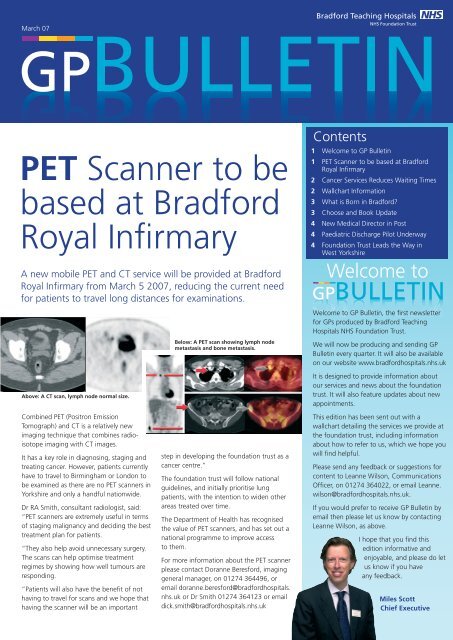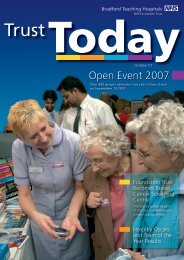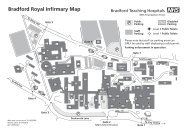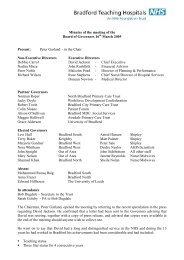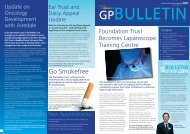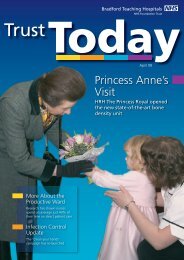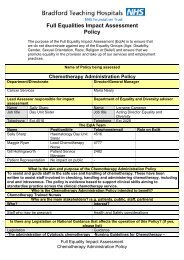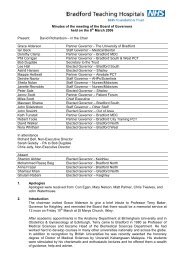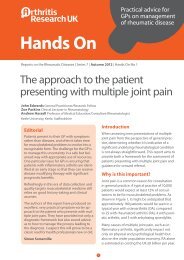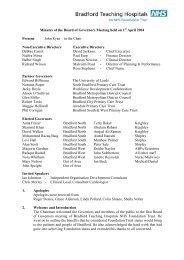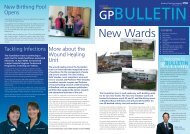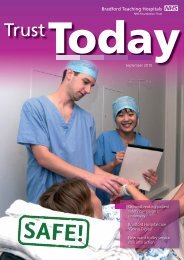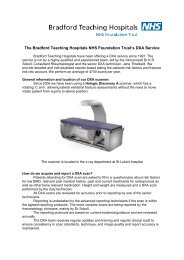GP Bulletin - Issue One - Bradford Teaching Hospitals NHS ...
GP Bulletin - Issue One - Bradford Teaching Hospitals NHS ...
GP Bulletin - Issue One - Bradford Teaching Hospitals NHS ...
- No tags were found...
Create successful ePaper yourself
Turn your PDF publications into a flip-book with our unique Google optimized e-Paper software.
<strong>Bradford</strong> <strong>Teaching</strong> <strong>Hospitals</strong><strong>NHS</strong> Foundation Trust<strong>GP</strong> BULLETINMarch 07PET Scanner to bebased at <strong>Bradford</strong>Royal InfirmaryA new mobile PET and CT service will be provided at <strong>Bradford</strong>Royal Infirmary from March 5 2007, reducing the current needfor patients to travel long distances for examinations.Above: A CT scan, lymph node normal size.Below: A PET scan showing lymph nodemetastasis and bone metastasis.Contents1 Welcome to <strong>GP</strong> <strong>Bulletin</strong>1 PET Scanner to be based at <strong>Bradford</strong>Royal Infirmary2 Cancer Services Reduces Waiting Times2 Wallchart Information3 What is Born in <strong>Bradford</strong>?3 Choose and Book Update4 New Medical Director in Post4 Paediatric Discharge Pilot Underway4 Foundation Trust Leads the Way inWest YorkshireWelcome to<strong>GP</strong> BULLETINWelcome to <strong>GP</strong> <strong>Bulletin</strong>, the first newsletterfor <strong>GP</strong>s produced by <strong>Bradford</strong> <strong>Teaching</strong><strong>Hospitals</strong> <strong>NHS</strong> Foundation Trust.We will now be producing and sending <strong>GP</strong><strong>Bulletin</strong> every quarter. It will also be availableon our website www.bradfordhospitals.nhs.ukIt is designed to provide information aboutour services and news about the foundationtrust. It will also feature updates about newappointments.Combined PET (Positron EmissionTomograph) and CT is a relatively newimaging technique that combines radioisotopeimaging with CT images.It has a key role in diagnosing, staging andtreating cancer. However, patients currentlyhave to travel to Birmingham or London tobe examined as there are no PET scanners inYorkshire and only a handful nationwide.Dr RA Smith, consultant radiologist, said:“PET scanners are extremely useful in termsof staging malignancy and deciding the besttreatment plan for patients.“They also help avoid unnecessary surgery.The scans can help optimise treatmentregimes by showing how well tumours areresponding.“Patients will also have the benefit of nothaving to travel for scans and we hope thathaving the scanner will be an importantstep in developing the foundation trust as acancer centre.”The foundation trust will follow nationalguidelines, and initially prioritise lungpatients, with the intention to widen otherareas treated over time.The Department of Health has recognisedthe value of PET scanners, and has set out anational programme to improve accessto them.For more information about the PET scannerplease contact Doranne Beresford, imaginggeneral manager, on 01274 364496, oremail doranne.beresford@bradfordhospitals.nhs.uk or Dr Smith 01274 364123 or emaildick.smith@bradfordhospitals.nhs.ukThis edition has been sent out with awallchart detailing the services we provide atthe foundation trust, including informationabout how to refer to us, which we hope youwill find helpful.Please send any feedback or suggestions forcontent to Leanne Wilson, CommunicationsOfficer, on 01274 364022, or email Leanne.wilson@bradfordhospitals.nhs.uk.If you would prefer to receive <strong>GP</strong> <strong>Bulletin</strong> byemail then please let us know by contactingLeanne Wilson, as above.I hope that you find thisedition informative andenjoyable, and please do letus know if you haveany feedback.Miles ScottChief Executive<strong>Bradford</strong> <strong>NHS</strong> <strong>GP</strong> Newsletter 1836.1 1 20/2/07 15:04:09
Paediatric DischargePilot UnderwayFoundation TrustLeads the Wayin West YorkshireThe foundation trust now hosts the onlydedicated paediatric metabolic tertiary servicein West Yorkshire.Led by consultant Dr Suresh Vijay, the service provides frequentmonitoring, dietetic and medical management, genetic advice,pre-natal screening, and performs neonatal testing.Dr Vijay said: “The team is highly skilled and specialised as InheritedMetabolic Diseases (IMD) are individually rare though as a groupare not uncommon. The service covers the whole spectrum fromprenatal testing and advice, through childhood and into adult life.4Paediatrics is committed to improvingcommunication with colleagues in primarycare following patient admissions.The service is currently piloting a new discharge summary sheetwhich is filled in and dispatched to <strong>GP</strong>s at the time of discharge.This sheet includes information on diagnosis, an overview ofin-patient management, medication on discharge and follow-uparrangements. The family are also given a copy of the sheet.For patients not on any medications this will replace the ‘TTO’self-carbonating form. For children with short, uncomplicatedadmissions, such as those for gastroenteritis or viral wheeze,there will be no further discharge summary sent.However, for children with more complicated or prolongedadmissions, a formal typed discharge summary will follow intime. We plan to convert this handwritten discharge summaryinto a typed document and hope that in time this can beemailed directly to the patient’s <strong>GP</strong>.We are very keen for your feedback about this new dischargesheet - for more information or comments please emailDr Rebecca Bardgett, consultant paediatrician, onbeccy.bardgett@bradfordhospitals.nhs.ukNew AppointmentsThe foundation trust appointed a newmedical director in November 2006.Dr Clive Kay took over the role from Dr Duncan Newton. Dr Kayis a consultant radiologist who has worked at the foundationtrust since 1998.He has special interests in gastrointestinal and oncologicalradiology. Before working in <strong>Bradford</strong>, Dr Kay spent three yearsat the Medical University of South Carolina in the USA as chiefof radiological services at the Digestive Disease Centre.Dr Kay is also the lead clinician for the West Yorkshire Upper GICancer Centre since 2001, the chairman of the Yorkshire CancerNetwork Upper GI Cancer group, and is currently the chairman ofthe West Yorkshire Diagnostic Imaging forum, and the chair elect ofthe British Society of Gastrointestinal and Abdominal Radiologists.“As there is a lack of adequate provision for the managementof adult patients with inherited metabolic diseases both locallyand nationwide, it is common practice at present to follow thesepatients up indefinitely in the existing paediatric metabolic clinics.”Most IMD occur slightly more often in populations with a highrate of consanguinity (i.e. marriages between first cousins andsometimes other relatives) such as <strong>Bradford</strong>. The foundation trustprovides an easily accessible and high quality service to patientsfrom this population with complex and rare metabolic disorders.IMD can vary in severity and clinical manifestations. Indeed, someIMD can be potentially life threatening. Most patients with IMDhave multi-system involvement and require the involvement ofspecialist teams in their management. Management of IMD ishighly specialised and can often prove expensive. Appropriatemanagement does, in some conditions such as Phenylketonuria(PKU), lead to a good outcome.Due to the rarity of IMD and lack of large scale clinical data there iscurrently very little evidence to support clinical practice. However,knowledge of IMDs and their management is increasing rapidly.Dr Vijay said: “It’s very important that we manage IMD effectively. Ithas enormous effect on patients and their families. We will thereforebe working hard to increase the awareness of these rare conditionsamong the medical community and also in the general population.”The service has a children’s metabolic nurse specialist who providesspecialist nursing care in the community as well as offering supportand advice to families.The service also has two metabolic dieticians providing specialistadvice as diet is fundamental to the management of most IMD.Dr Vijay also provides clinics at Airedale <strong>NHS</strong> Trust and at Leeds<strong>Teaching</strong> <strong>Hospitals</strong>. The team has close links with the serviceprovided in Manchester and with the metabolic biochemistry lab inLeeds. There are twice weekly clinics hosted by the service atSt Luke’s hospital.Referrals to the service generally come from neonatal services,newborn screening, child development and paediatric neurology,and occasionally from primary care.Dr Vijay is working at setting up a Yorkshire-wide managed clinicalnetwork for IMD, and to establish more outreach clinics.For more information email either suresh.vijay@bradfordhospitals.nhs.uk or inderdip.bhambra@bradfordhospitals.nhs.ukor phone 01274 365049/382304.<strong>Bradford</strong> <strong>NHS</strong> <strong>GP</strong> Newsletter 1836.4 4 20/2/07 15:04:14


